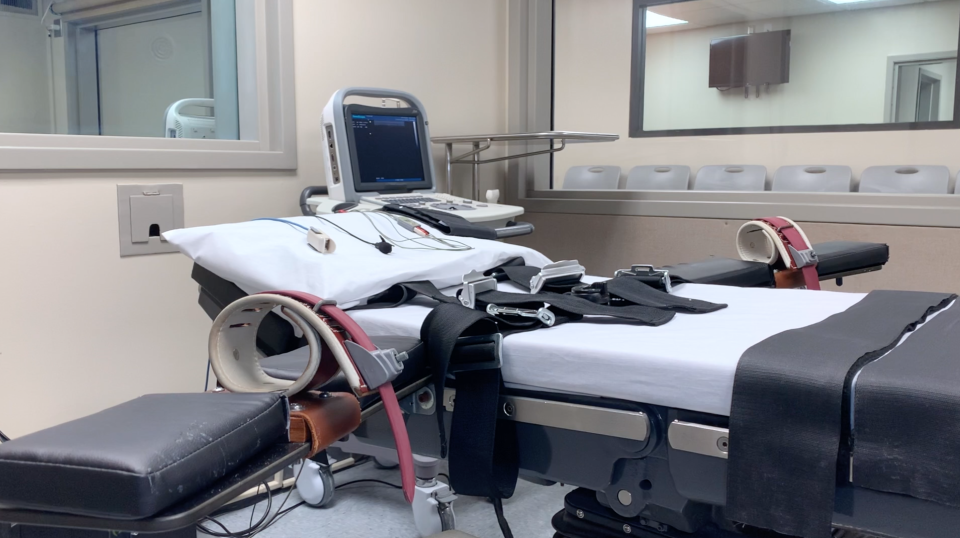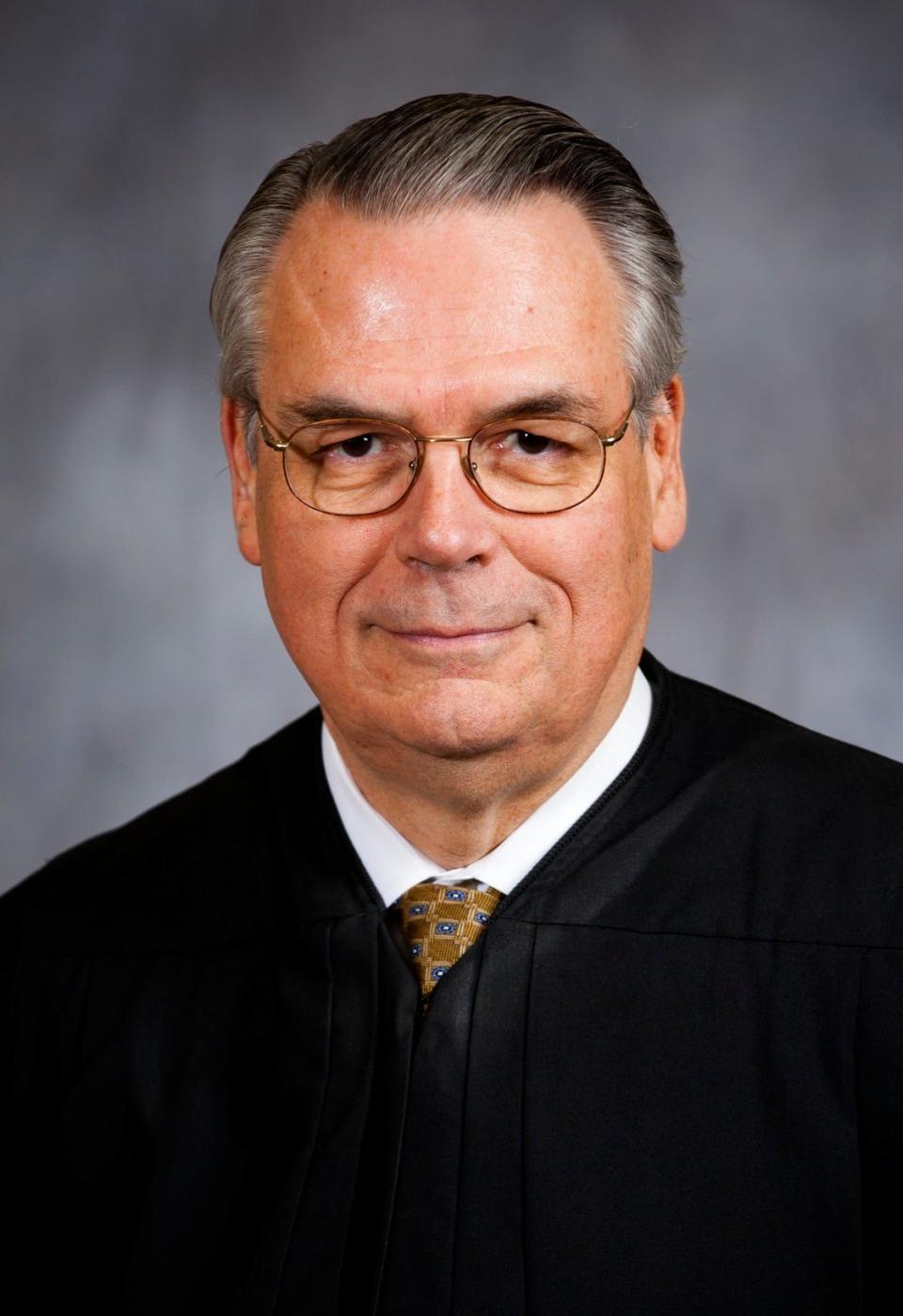28 Oklahoma death row inmates could be executed over next two years after judge's ruling
- Oops!Something went wrong.Please try again later.
A federal judge on Monday rejected a legal challenge to Oklahoma's execution protocol, ruling it does not violate a constitutional prohibition against cruel and unusual punishment.
The decision clears the way for the state to carry out as many as 28 executions by legal injection over the next two years.
Up first could be convicted murderer Richard Glossip, despite his innocence claim that continues to find support.
Inmates specifically complained that the sedative midazolam — the first drug in the three-drug process — doesn't work. They contended they will feel extreme pain as the second and third drugs take effect.
U.S. District Judge Stephen Friot disagreed, finding it highly probable that an inmate will feel no pain "within a very short time after the midazolam is pushed."
Oklahoma’s current protocol involves the intravenous injection of midazolam, followed by a paralytic, vecuronium bromide, and then the heart-stopping drug potassium chloride.
The judge heard conflicting testimony about midazolam over a six-day trial in Oklahoma City federal court earlier this year.

"The evidence persuades the court, and not by a small margin, that even though midazolam is not the drug of choice for maintaining prolonged deep anesthesia, it can be relied upon, as used in the Oklahoma execution protocol, to render the inmate insensate to pain for the few minutes required to complete the execution," he wrote in his 43-page ruling.
The U.S. Supreme Court requires inmates to show that a challenged execution method “is sure or very likely to cause serious illness and needless suffering,” the judge wrote. The inmates "have fallen well short of clearing the bar set by the Supreme Court," he concluded.
Friot further pointed out in his conclusions that the Supreme Court has said an inmate is not guaranteed a painless death and that courts "do not sit as boards of inquiry charged with determining best practices for executions."

Oklahoma resumed executions last October after a hiatus of more than six years. Three inmates were executed after Friot kicked them out of the legal challenge. One was never in the case.
The judge made detailed findings about those executions in his ruling.
"The credible evidence persuades the court that there is a high probability, with respect to each of the four recent Oklahoma executions, that the ... sequence, beginning with the injection of 500 milligrams of midazolam, worked as intended," he wrote. "It is highly probable that the inmates felt no physical pain other than that associated with the insertion of the IV lines."
He specifically found that John Grant had been rendered unconscious by midazolam "before he lost his gastric contents."
Story continued below
He also noted Grant had been eating chips and drinking soda just 45 minutes before his execution was scheduled to begin. "In fact, that physiological result of administering that massive dose of midazolam to a man with a full stomach was unsurprising," he wrote.
The judge called most persuasive the testimony of a key state expert, Dr. Ervin Yen.
The longtime Oklahoma City anesthesiologist witnessed three of the recent executions and testified as an expert at the request of the attorney general's office. Yen told the judge at trial the state's execution protocol is "adequate to carry out an execution in as humane a way as possible."
The judge wrote, "Rarely, in any field of litigation, does a court see and hear well-qualified expert witnesses giving expert testimony as squarely — and emphatically — contradictory, on the issues at the heart of the matter, as in this case.
"Some of the opposing experts in this case have squared off in other midazolam challenges in other courts around the country, in what amounts to a midazolam roadshow. ... There is one fresh face in this case, and a credible one at that. That is Dr. Ervin Yen, a practicing anesthesiologist who has administered midazolam and observed its effects thousands of times."

Attorneys for the inmates criticized Yen in a post-trial filing, suggesting he was biased. "Yen is a politician, having served as a State Senator and he was at the time of trial a candidate for Governor," they wrote.
The judge scolded the attorneys in a footnote for their criticism of Yen. "The implicit suggestion that Dr. Yen’s credibility is somehow diminished by his public service borders on the offensive," he wrote.
"The court’s confidence in Dr. Yen’s expertise ... is based predominantly on ... his vast experience with midazolam and other anesthetic agents and ... his cogent explanation of the basis for the opinions to which he testified. The court cannot but note, also, that Dr. Yen was chosen by four of his colleagues in the practice of anesthesiology to be their anesthesiologist for their heart surgeries."
After the ruling, the archbishop of Oklahoma City again called for state leaders to abolish capital punishment.
“No matter the decision of the court on Oklahoma’s protocol, the use of the death penalty only contributes to the continued coarsening of society and to the spiral of violence," Archbishop Paul S. Coakley said.
"Taking another life does not ultimately bring closure and peace to those who have lost a loved one, and it goes against the principle of valuing life."
Oklahoma currently has 43 inmates awaiting execution. The newest on the list is David Ware, who was convicted of fatally shooting a Tulsa police sergeant during a 2020 traffic stop.
The plaintiffs in the legal challenge are 28 of those inmates. Most have exhausted their appeals of their convictions and punishment.
“The people of Oklahoma and the families who have suffered the murder of a loved one moved one step closer to justice with today’s ruling,” Attorney General John O'Connor said in a news release.
The attorney general this week plans to ask the Oklahoma Court of Criminal Appeals to set execution dates, according to the news release.
Attorneys for the inmates will now take the challenge to the 10th U.S. Circuit Court of Appeals in Denver.
“The district court’s decision ignores the overwhelming evidence presented at trial that Oklahoma’s execution protocol, both as written and as implemented, creates an unacceptable risk that prisoners will experience severe pain and suffering," attorney Jennifer Moreno said.
The lead plaintiff on the legal challenge is Glossip, an Oklahoma City motel manager who was convicted in the 1997 murder of his boss. Among his outspoken supporters is state Rep. Kevin McDugle, R- Broken Arrow.
“I do believe personally that we have an innocent man on death row,” McDugle said last year at a news conference.
Glossip was to have been executed on Sept. 30, 2015, at the Oklahoma State Penitentiary in McAlester. The lethal injection, though, was called off after a doctor discovered the wrong deadly drug had been supplied.
The other plaintiffs are James A. Coddington, Benjamin R. Cole, Carlos Cuesta-Rodriguez, Richard S. Fairchild, Wendell A. Grissom, Marlon D. Harmon, Raymond E. Johnson, Emmanuel A. Littlejohn, James D. Pavatt, Kendrick A. Simpson, Kevin R. Underwood, Brenda E. Andrew, Phillip D. Hancock, Alfred B. Mitchell, Tremane Wood, Wade Lay, Ronson Kyle Bush, Scott Eizember, John F. Hanson, Mica Alexander Martinez, Ricky Ray Malone, Clarance Goode, Anthony Sanchez, Michael Dewayne Smith, James Ryder, Richard Rojem and Jemaine Cannon.
The Oklahoma Court of Criminal Appeals is not expected to set an execution date for Lay right away — if asked — because of an upcoming jury trial on his mental state. His attorney contends he is not presently competent to be executed because of delusions.
The competency trial is set for next May in Pittsburg County District Court.
This article originally appeared on Oklahoman: Federal judge allows Oklahoma executions to go forward

